Right-Wing Resurgence in Germany in 2019
Background
Following the end of World War II in 1945, Germany underwent a process of denazification and subdivision until the reunification of West and East Germany in 1990. Today, this legacy finds expression through contemporary right-wing politics and extremism.
The migrant/refugee crisis that began in 2015 has proved to be a watershed moment as Germany, the economic powerhouse of the European Union, became the most popular migrant destination. Chancellor Angela Merkel of the Christian Democratic Union (CDU) and her administration controversially welcomed over 1.5 million migrants.
Germany has since faced a right-wing resurgence. This has emerged from a range of sources, including legitimate movements such as Alternative for Germany (AFD) and illegitimate violent extremists. The growth of the latter has led to a warning from the Federal Office for the Protection of the Constitution (BFV) that levels of right-wing extremism are at their highest ‘since 1945’.
Perceived Integration Failure and Economic Competition
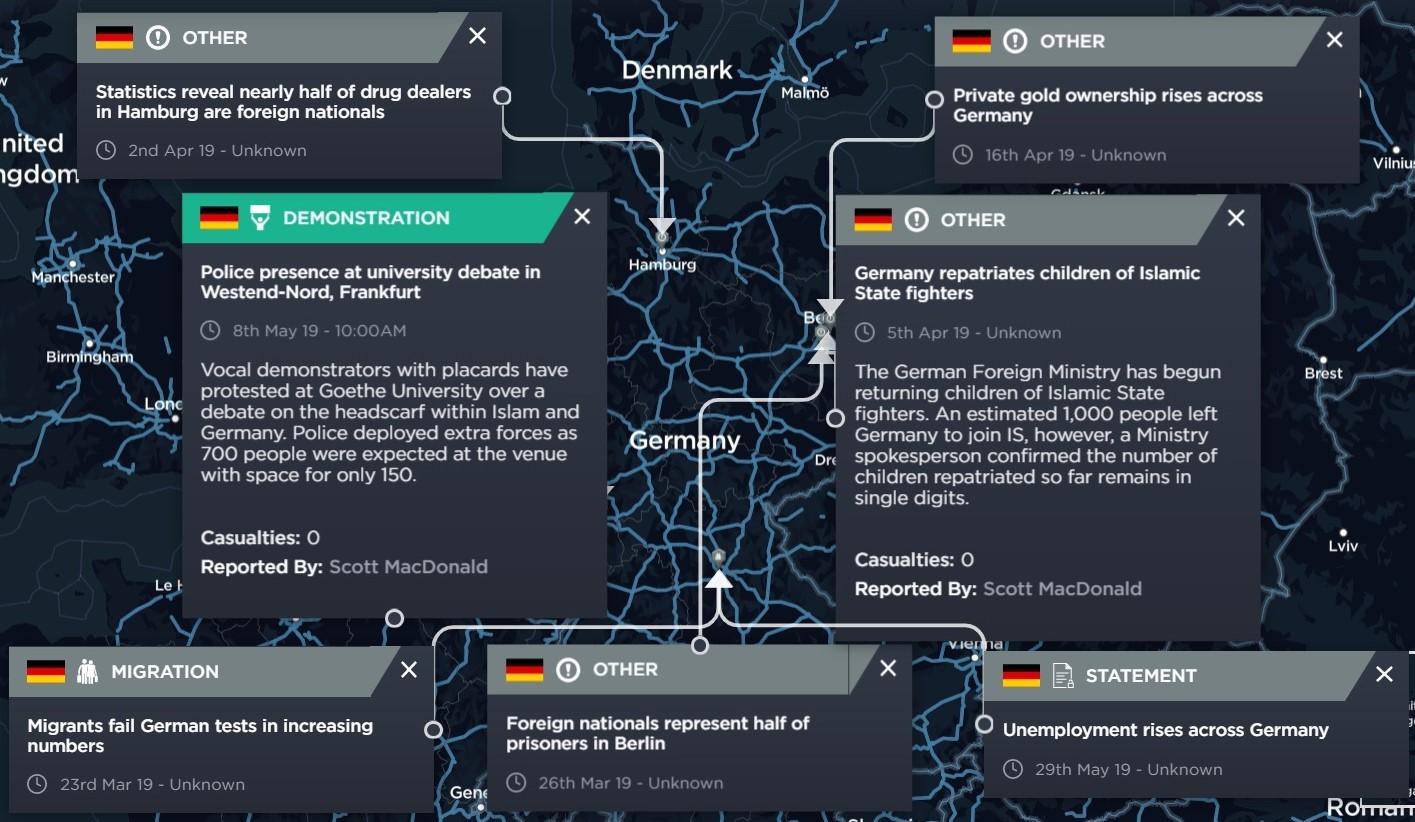
Migrants are twice as likely to face poverty than the wider German population (22.2% – 11.3%). The sociology of poverty and crime is well-established, however, the perceived correlation between criminality and migrants, alongside differences of language and religion, has led to an assumption that migrants have failed to integrate. This has polarised and hardened attitudes towards them in certain elements of German society.
These ongoing tensions are much more prevalent and observable in lower socio-economic zones, notably in what was formerly East Germany. This conclusion was highlighted in a case-study of Cottbus in Brandenburg by Antonija Podrug. It has also found recent support from the Institute of Economic and Social Research (WSI).
Reporting on 24 April 2019, WSI research shows that inequality is increasing across the former German divide. Those residing in the South/West typically have double the disposable income of their neighbours in the North/East. Alongside growing unemployment, the ‘German Fear’ phenomenon highlights that Germans hold 6.5% of global gold despite having only 1% of world population.
Right-Wing Backlash and Response
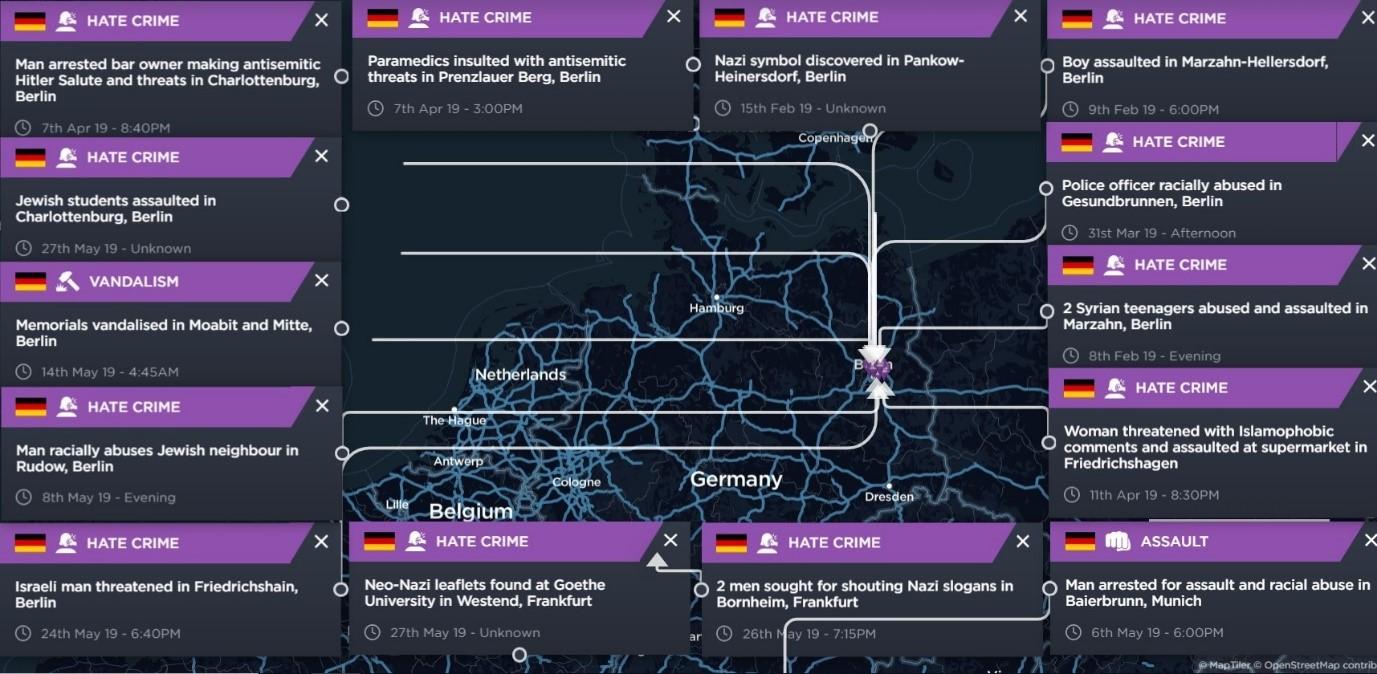
This social concern and economic mistrust has fuelled a right-wing backlash against perceived outsiders and given rise to a belief that the state is enabling them. Politically, this was showcased most recently at the 2019 European Parliament elections where AFD won 11% of the national vote as well as majorities in Brandenburg and Saxony, two formerly East German states. Establishment parties such as the CDU and Social Democratic Party of Germany (SPD) suffered significant losses.
However, alongside political activity there has been a growth in violent right-wing extremism. Incidents of hate crime reported by Intelligence Fusion have increased each month in 2019 from two in January to eleven in May. These crimes often include references to Nazism, especially when the incident is motivated by anti-Semitism. Statistics highlight that instances of anti-Semitism rose 10% between 2017-2018 from 1,504 to 1,646.
Federal Commissioner Felix Klein advised Jews on 25 May 2019 against wearing the kippah in public, indicating his belief that this trend seems set to continue in 2019. Aside from personal attacks, other recent targets include Holocaust and resistance memorials as well as symbolic state representatives such as paramedics, police officers and universities.
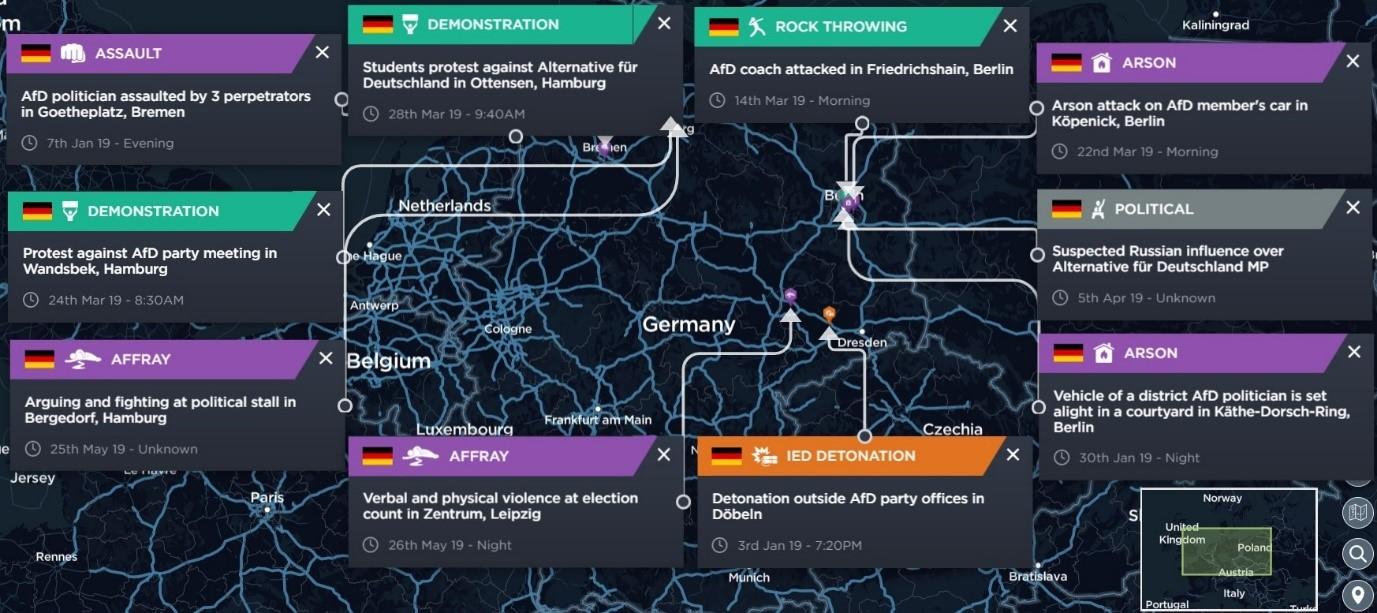
The rise in anti-Semitic attacks cannot be attributed solely to right-wing extremism. The influx of migrants from the Middle East, often from an Arab background may also have contributed to the rise of these statistics due to historic rivalry.
However, those with an apparent migrant background are just as susceptible to attacks of violence, racism and xenophobia. The increasing likelihood of such incidents and the perceived threat they create in the public imagination can be tracked by analysing counter-attacks on right-wing symbols. For example, attacks on AFD range from assault, arson and bombings and highlight a parallel response to their growing support that is keeping apace and matching the severity of right-wing incidents.
Growth of Paramilitary Extremism
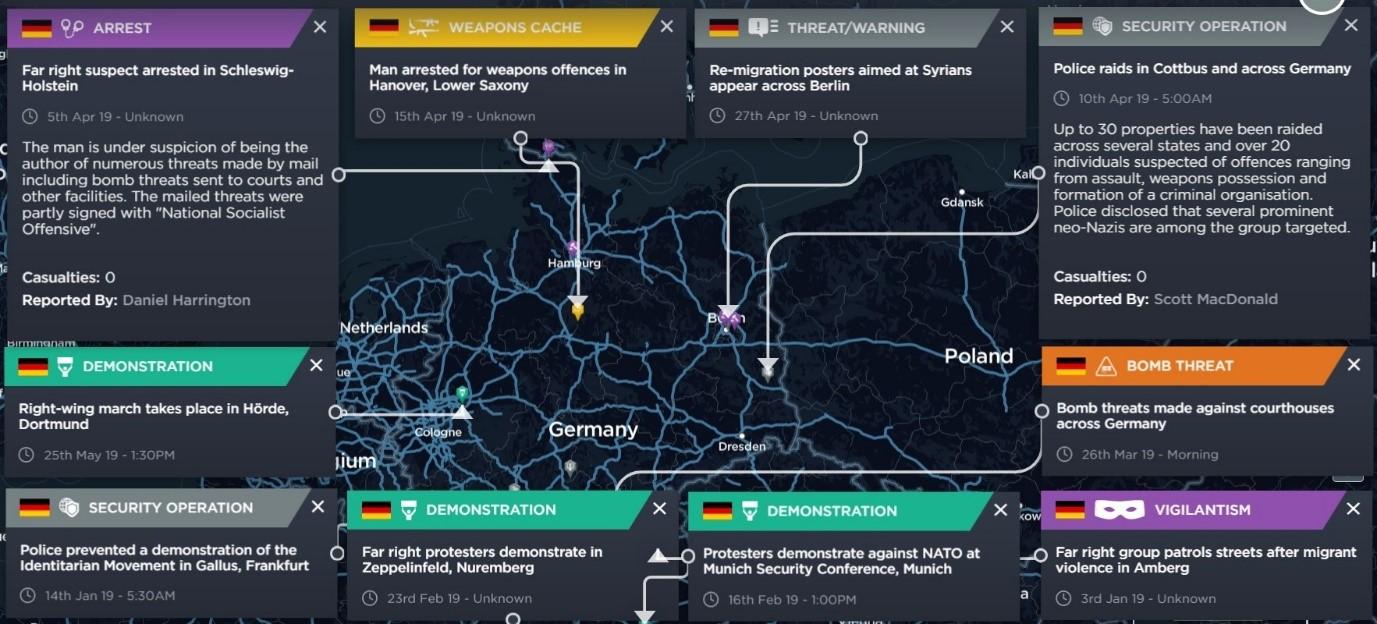
The domestic intelligence service (BFV) reported on 21 April 2019 that right-wing extremism is at its worst extent since World War II. This has been driven by the growth of what could be described as spontaneous grassroots extremism. Individuals or small groups of people have been increasingly radicalised often without direction or influence from older established right-wing groups.
This is largely taking place online and allows for global interaction with similar groups. Examples include Identitare Bewegung, the German branch of the Identitarian Movement founded in France or Atomwaffen Division, a neo-Nazi group founded in the United States which recently distributed leaflets at Goethe University encouraging the ‘murder of Muslims’.
The BFV report highlights that while these aligned groupings find commonality in topics such as ‘asylum, migration [and] Islam’ and espouse violent and extremist views, poor organisation means there are ‘glaring gaps between [the] planning and reality’ of possible terrorist acts. Nevertheless, it is proactive and preventative measures that ensure that a low threat level is maintained as highlighted by Angela Merkel’s recent announcement that police should safeguard every synagogue and Jewish school in Germany.
However, there has to be recognition that improvements can always be made. Reported on the same date as the BFV report, a serving member of the German army sent media organisations a portfolio of evidence highlighting the extent of extreme right-wing views within the military. Such views included questioning the ‘legitimacy of the Federal Republic’ and the individual involved reportedly took these steps after these concerns were dismissed by superiors.
It is clear that eighty years after the start of World War II and nearly thirty years since reunification, Germany must continue to address internal division concerning politics, race and identity.
Using the Themes tool within the Intelligence Fusion platform, we can monitor the resurgence of right-wing extremism, identifying trends and patterns within the incidents to give you an additional layer of analysis.
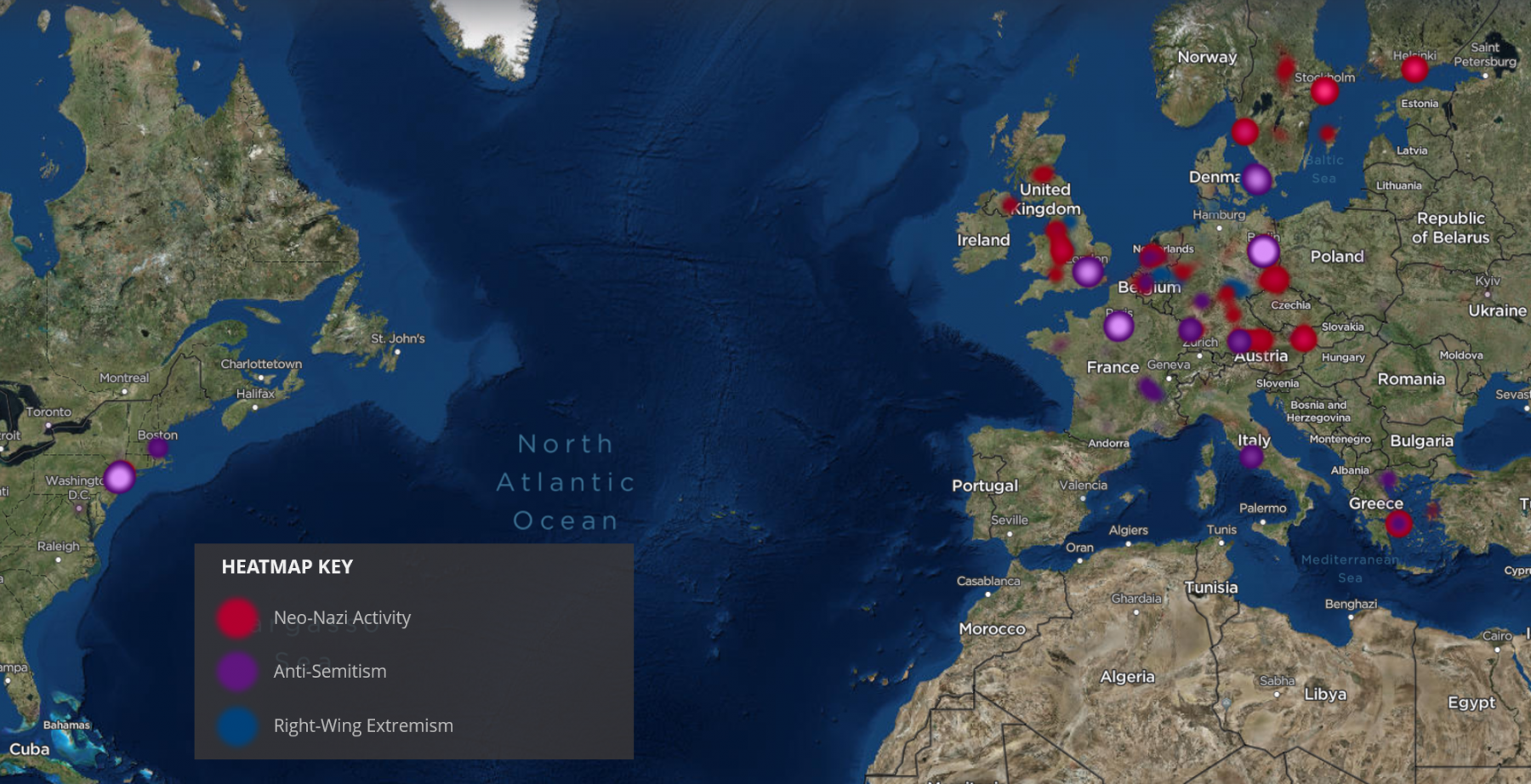
If you’d like to take a closer look at the tools we’ve developed to provide a deeper level of context, book you free demo today.
References
https://www.bbc.co.uk/news/world-europe-45419466
https://www.faz.net/aktuell/politik/inland/neonazis-verfassungsschutz-warnt-vor-rechtem-terror-16161037.html
https://www.intelligencefusion.co.uk/blog/cottbus-germany-refugees-a-poor-economy-and-the-far-right
https://www.dw.com/en/german-income-inequality-a-cause-for-concern-as-east-west-divide-deepens/a-48465438
https://www.faz.net/aktuell/finanzen/meine-finanzen/sparen-und-geld-anlegen/edelmetalle-warum-deutsche-so-viel-gold-wie-nie-horten-16142337.html
https://www.faz.net/aktuell/politik/europawahl/analyse-der-europawahl-ueber-sieg-der-gruenen-und-die-afd-im-osten-16208373.html
https://www.jns.org/rise-in-anti-semitic-incidents-in-germany-in-2018/
https://www.theguardian.com/world/2019/may/26/jews-in-germany-warned-of-risks-of-wearing-kippah-cap-in-public
https://www.faz.net/aktuell/politik/inland/neonazis-verfassungsschutz-warnt-vor-rechtem-terror-16161037.html
https://www.faz.net/aktuell/rhein-main/frankfurt/nazi-flugblaetter-an-der-goethe-uni-abgeworfen-16208049.html
https://www.rt.com/news/460499-merkel-germany-antisemitism-cnn/
https://www.faz.net/aktuell/politik/inland/bundeswehrsoldaten-posten-offen-rechtsradikales-16150935.html

